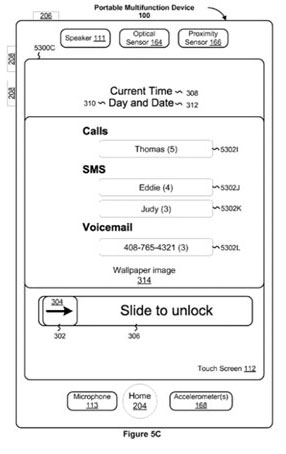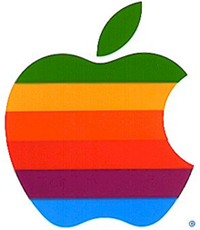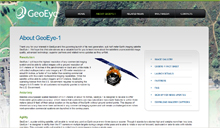Archive for the ‘Technology’ Category
Posted by //
Sean
Date //
Sep 19, 08 - 6:42 am
Categories //
Apple
Technology
Toys & Gadgets
Wireless
Comments Off on Apple Patent Shows ‘Today’ Screen For iPhone
The basic home screen of a Windows Mobile 6.1 device gives you a nice overview of your recent missed calls, messages, calendar appointments and other items.
Looking at a recently-granted patent, looks like Apple may be taking a page from Microsoft’s playbook.
The “today” screen in Windows Mobile is one of the better features of the OS, especially in the 6.1 version of Windows Mobile.

At a glance, you can see what you’ve missed while you weren’t minding your phone, and what you might still have to accomplish in a given day.
MacRumors saw a patent that was granted to Apple, and the drawings accompanying the patent clearly show an “at a glance” style screen on the iPhone. MacRumors reports:
“The proposed screen would allow users to quickly jump to the desired notification simply by pressing on the corresponding notification. At present, the iPhone’s notification lists is a list that disappears when the phone is unlocked. This sort of notification system may become more important once 3rd party ‘push’ notifications are activated, as the number and variety of these notifications will likely increase significantly.”
The idea of being able to see a list of all your missed calls and messages is not privy to just Windows Mobile. Nokia’s S60 platform can be set up to provide a similar display of notifications.
I think this would be a welcome addition to the iPhone’s software. If and when it will ever be included in a future firmware update is unknown.
Posted by //
Sean
Date //
Sep 16, 08 - 8:02 am
Categories //
Instant Messaging
Technology
Wireless
Comments Off on Are Text Messages Responsible For 25 Deaths?
 Saturday’s Metrolink train crash was a tragedy and may have occurred because the engineer was distracted by text messages sent to his cell phone.
Saturday’s Metrolink train crash was a tragedy and may have occurred because the engineer was distracted by text messages sent to his cell phone.
The possibility raises the issue of how companies are to handle personal technology in the workplace, especially when lives are at stake.
The Metrolink crash that took place in California on Saturday happened because the train failed to yield to a stop signal.
The passenger train then rammed into the back of a freight train that was sitting on the same track, killing 25 of those aboard and injuring more than 100 others.
Why didn’t the engineer stop the train? Federal officials are investigating the possibility that the engineer was distracted by text messages.
Apparently two teenagers were interested in trains and had befriended the engineer. They sent him text messages to ask him about his work, and were sending him messages in the minutes leading up to the crash.
“We have been in contact with them and their families. They have been fully cooperative,” Kitty Higgins of the National Transportation Safety Board said. “We are going to be obtaining records from their cell phones and of the deceased … to begin to determine what might have happened and what if any role [cell phones] might have played in this accident.”
Metrolink train engineers are not allowed to use their cell phones while on duty, and for good reason.
Nearly every adult in the U.S. has a cell phone. Odds are, most of them are bringing them to work. Many keep them tucked away in their briefcase or purse while in the office.
However, others are not so quick to ignore what is increasingly used as a link to outside social networks. Let’s discount whether or not they are being used to breach corporate security or simply waste time while on the clock.
How are companies to govern their use when safety is a priority?
Sure, businesses can put policies in place that forbid their use at the workplace, as Metrolink did, but that doesn’t mean those policies will be followed. They certainly won’t be followed if the policies aren’t strictly enforced.
Could Metrolink have taken any more steps to prevent the train’s engineer from bringing his cell phone onto the train on Saturday? Would that have prevented the crash and saved the lives of the 25 who were lost? Should Metrolink be held liable in this case, or does the blame lay fully with the engineer?
Should different rules be set in place for those who are responsible for the lives of others, such as train engineers, airplane pilots, bus drivers, truck drivers, etc.?
I think they should but what form those rules take, how they are enforced, and what consequences are tied to them need serious consideration.
Picture Source: CNN via KTLA News Channel
 Today is an auspicious day in the history of Steve Jobs. It’s the day he quit Apple and also the day he returned.
Today is an auspicious day in the history of Steve Jobs. It’s the day he quit Apple and also the day he returned.
Jobs resigned as chairman of Apple Computer on September 16, 1985, after losing a boardroom battle for control of the company with then-CEO John Sculley.
Jobs had co-founded Apple about eight years earlier with his hacker friend Steve Wozniak.
A pair of teenagers, the two Steves had little idea how to grow the hot company at the dawn of the soon-to-be-giant PC industry.
Jobs helped recruit Sculley from Pepsi-Cola, where Sculley had shown a genius for lifestyle advertising. The pair ran Apple as co-CEOs but fell out and took their differences to the board. Though a visionary, the board decided Jobs was too volatile for the lead role. So he quit.
On the same day he resigned, Jobs submitted incorporation papers to the California secretary of state for the name of his new company, NeXT Computer.
NeXT was Jobs’ revenge. Jobs founded NeXT with the express purpose of running Apple into the ground. NeXT would develop computers that were far better than anything Apple could offer, and Apple would soon be out of business.
NeXT never did put Apple out of business, and for the next 10 years just barely survived itself. It did, however, produce a fantastic operating system, NeXTStep, which many praised as ahead of its time.
In December 1996, Apple bought NeXT for $400 million. It wanted NeXTStep to form the basis of a new, modern operating system, one that didn’t crash every time Netscape Navigator was launched.
Jobs came on board as an informal adviser to then-CEO Gil Amelio. But within months, the board fired Amelio after Apple suffered one of the biggest quarterly losses in Silicon Valley history.
Jobs was initially reluctant to take a role at Apple. His other company, Pixar, had just released its first movie, Toy Story, to great acclaim. But he soon found himself putting in more time at Apple, working hard to whip it into shape.
On September 16, 1997, Apple announced that Jobs had officially been named interim CEO, or — as the company cleverly put it — iCEO.
Posted by //
Sean
Date //
Sep 10, 08 - 1:37 pm
Categories //
Instant Messaging
Technology
Toys & Gadgets
Wireless
Comments Off on BlackBerry Devices Get Native AIM From AOL
You might think that the world’s best mobile e-mail devices would also be killer instant messenger devices. Though users were able to use GChat, Yahoo IM, and Windows Live Messenger, AOL’s AIM was AWOL.
RIM and AOL have teamed up to offer a native AOL Instant Messenger application for BlackBerrys. Time to break our your thumbs and get your IM on!
Mobile instant messaging has been catching on in a big way in the last year. Many people use AOL’s AIM program, and it seems to be the IM client rigueur, especially in the United States.
Now the power of AIM has come to the BlackBerry. AOL and RIM announced the availability of AIM and ICQ instant messaging services, as well as AOL Mail on BlackBerry smartphones.
The BlackBerry press release notes:
“The deep integration of AOL’s popular communications services with BlackBerry smartphones will allow consumers around the world to seamlessly access AOL’s most popular services directly from their BlackBerry smartphone and communicate in real-time with business associates, family, friends and other contacts.”
From their BlackBerry smartphone, AIM and ICQ users can also:
- Access Buddy List features including the ability to see if contacts are online and available to chat (i.e. presence);
- Set customized away messages and manage their AIM or ICQ online status (e.g. available, away, in a meeting, etc.) directly from the BlackBerry smartphone’s home screen without launching the AIM or ICQ application;
- Set alerts to notify them when a contact’s online availability changes;
- Select the Auto Sign-In option which will automatically sign them into AIM or ICQ when their BlackBerry smartphone is powered on;
- Use Picture IM to send and receive images;
- Log and save IM conversations for personal records or to email them to other contacts; and
- Select from a collection of pre-set emoticons to further customize their instant messages.
This is all very good stuff. What’s even better is that the software is available starting today for free, though it requires BlackBerry OS 4.5.
The AOL Mail offering will be well-integrated into the BlackBerrys e-mail application. It will sync just as corporate e-mail would, and will be pushed to the handset in real time. This is a good move for BlackBerry, which is proving to be more consumer-friendly every day.
Posted by //
Sean
Date //
Sep 10, 08 - 7:26 am
Categories //
Geekery
Google
Technology
Videos
Comments Off on Google, REM And The Large Hadron Collider (LHC)
So today was the big day for the Large Hadron Collider to fire up and possibly create black holes that would gobble up the Earth and Google celebrated with a light speed inspired Google logo:
Here’s a little nugget about the LHC:
The Large Hadron Collider (LHC) is being built in a circular tunnel 27 km in circumference. The tunnel is buried around 50 to 175 m. underground. It straddles the Swiss and French borders on the outskirts of Geneva.
It planned to circulate the first beams 10th September 2008. First collisions at high energy are expected about a month later with the first results from the experiments soon after.
The LHC is designed to collide two counter rotating beams of protons or heavy ions. Proton-proton collisions are foreseen at an energy of 7 TeV per beam.
If you want to find out more about the Large Hadron Collider, check out the official website which is loaded with all sorts of geektastic information to make your head spin.
To quote the band R.E.M. from the video below, did you think it was “the end of the world as we know it?”:
I don’t know about you, but I was slightly worried about the Earth being sucked into a black hole. I know, such a nice thought as I was getting ready for bed last night.
Posted by //
Sean
Date //
Sep 8, 08 - 9:02 am
Categories //
Geekery
Google
Technology
Comments Off on Google Launches Mapping Satellite
 Google has expanded its reach into space with the successful launch Saturday of a new satellite that will provide the company with exclusive images for its maps.
Google has expanded its reach into space with the successful launch Saturday of a new satellite that will provide the company with exclusive images for its maps.
After an 11:50 a.m. takeoff from Vandenberg Air Force Base in California, the GeoEye-1 satellite relayed a downlink signal to a ground station in Norway, confirming that it had separated from its United Launch Alliance Delta II rocket and had begun to initialize its onboard systems.
The satellite launch was coordinated by terrain mapping company GeoEye. “Based upon the data we saw, the satellite is performing properly and ready to begin the next phase towards meeting its mission requirements,” said Bill Schuster, GeoEye chief operating officer, in a statement.
GeoEye said the 4,310-pound satellite required calibration and check-out period before the company would sell its images.
Although GeoEye did not mention Google in any of its announcements regarding the satellite, the search engine giant’s name appeared on the satellite and company founders Sergey Brin and Larry Page attended the launch, according to reports.
GeoEye said it plans to sell the images to customers around the world, but a Google spokesperson said that Google has exclusive rights to the images for commercial maps.
“The imagery from GeoEye-1 adds to the quantity and quality of that currently provided by our IKONOS satellite, and together this magnificent constellation will enable us to meet world-wide customer demand,” Matthew O’Connell, GeoEye CEO, said.
GeoEye-1 is part of the National Geospatial-Intelligence Agency (NGA), NextView program, which aims to obtain timely and accurate commercial satellite imagery.
It will collect 0.41-meter ground resolution black and white images and 1.65-meter color images simultaneously. It can show objects as small as 16 inches. U.S. licensing restrictions limit commercial images to a half-meter ground resolution.
The satellite can capture the images from 423 miles above the Earth and travel about 4.5 miles per second.
General Dynamics Advanced Information Systems in Gilbert, Ariz., built the satellite, while ITT in Rochester, N.Y., developed the imaging system. ITT is building another imaging system for GeoEye-2, which is scheduled to launch in 2011.
GeoEye said it won a $500 million NextView contract four years ago, and it built and launched the satellite with no cost overruns.
Source: GeoEye-1 Launch Site
